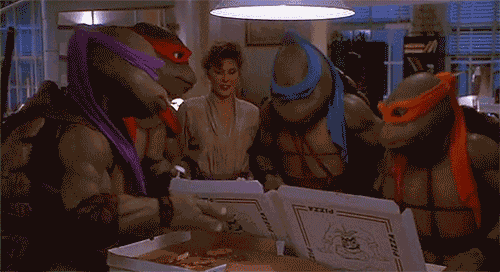Today you will earn your black belt in word count butt-kickery.

No, not like that. That's for the orange belt in car-cleanery.
What I'll be teaching you are three simple ways to clean up your writing and hear your word count scream UNCLE!
Respectfully, of course.
Ninja trick 1:
Drop kick your starts
I'm the world's worst abuser of using "starting" or "started to" in my writing. But the good news is that these are so easy to get rid of. And most of the time, they never needed to be there in the first place. They tend to sneak in like little foot soldiers and beef up our word count against our wishes.
Take this sentence for example:
Tom started to reach for his phone, pausing as the door opened.
We can easily trim this bad boy down two whole words (squee!) by taking out the started to.
Tom reached for his phone, pausing as the door opened.
Of course, there are times when you need the starts. Sometimes you need to show something started to happen, but never finished. For example:
I started my homework.
And, yeah, I used that example because homework's something I always started but never finished.

Ninja trick 2:
Throat punch your feelings
I know what you're thinking. "You mean sort of like how Tiffany did back in 8th grade when I asked her to the end of the year dance and she just LAUGHED AT ME AND STARTED TO WALK OFF WITH HER FRIENDS?!"
Yes. But she didn't start to walk off, man. She walked off.
Remember rule 1.
Go through any single page of your writing and do a quick search for these words: feel, wonder, realize, seem, decide, see, hear, think, or watch.
These tiny little boogers show up more than we realize--I mean--more than we think they do--wait, no--more than we feel is necessary--
Get the point?
These words, also known as filter words, aren't always evil. But most of the time they are. Because they end up being a barrier, forcing us to squeeze the world we write through the tiny little cracks and holes in them. Instead, we could just get rid of them altogether and let the main character (and your reader) experience the world first hand.
Take this sentence for example:
Jamie clawed her way up the side of the castle. She felt the gritty stone crumble beneath her feet with each step. Above her, Daniel passed by holding a torch. Jamie saw her armor become bathed in light for a moment. She wondered if she'd been caught.
By getting rid of those feelingly filter words, we can slice off eight words!
Jamie clawed her way up the side of the castle. The gritty stone crumbled beneath her feet with each step. Above her, Daniel passed by. His torch bathed her armor in light for a moment. Had she been caught?
But just like the first rule, this one is as bendy as a stalk of bamboo. Sometimes you need the feely words. Sometimes there's no other way to say what you need to say. For example:
They leaned down to smell the pizza.

Because you should always lean down to smell the pizza. That's what the pizza makers expect. It'd be rude not to.
Ninja Rule 3:
Really neck-crack the really
Ignoring the fact that these are getting progressively more violent, the third rule is a biggie.
Really is one of those words that is both acceptable and terrible at the same time. It falls into the same category as totally, especially, absolutely, and any other adverb.
Because they're all adverbs.
We've all heard adverbs are the worst thing in the literary world, but let's be honest. They're necessary. We can't write without them. Words like up, out, here, down, in, when, or most are commonly used and don't usually cause a stink.
Words like commonly and usually, though? Put those in a sentence and Stephen King will hunt you down.
My point is, we need adverbs. But we also don't need adverbs. It's a thin line to walk, but you've got to decide for yourself whether or not one is needed.
Take this scene for example:
Rob opened the door. Stacey quickly barged in past him, dropping a laundry basket of snakes on his couch.
"You sure you don't care?" she asked.
"No, really. It's, um, fine."
Stacey nodded. "Good," she said, running her hand down the scaly back of a snake. "They've been fed already. So just let them crawl around a little til I get back. But don't look the big one in the eyes. It'll charge you if you do."
Rob's entire body turned to ice. "Seriously?"
Stacey rolled her eyes. "No, Rob. Not seriously."
There are a lot of adverbs in there. But if it were up to me, I'd only cut a couple. I'd cut quickly and scaly. If you listen to people talk, you'll probably hear that we use adverbs a lot in conversation. Especially ones like Really? and Seriously? and Totally!
I'm pretty sure the younger the person, the more adverbs they use. As if we old farts are realizing our time's a heck of a lot more limited so we're self-editing everything we say in case we drop dead mid-sentence.
Naw, I'm just kidding. We're still young.

Ish.
There ya go!
Three easy ways to katana-slice up your word count a little at a time. These aren't the only three ways, of course, but they'll certainly get your started. And remember, just like any rule, these can be broken. You're the writer. It's your story. If you feel that a word needs to be there, then leave it there.
But if a little cleaning up is in order?

I'm starting to feel like you could totally go for it!
Happy writing!

11 comments:
Nice! Great pointers for cleaning up all over prose, and as a ninja fan, I thought the level of violence quite reasonable. ;)
--Suzanne
www.suzannewarr.com
Great post! And I like your stance on adverbs, especially when you write MG or YA dialogue. As the mom of a 16yo daughter, I can vouch that "literally" is something she and her friends use in conversation all the time!
Terrific post Brooks! DK
Great post (and super timely, as I am currently trying to weed about 900 words out of a chapter book. My young son just wandered over, and is now amazed that Mom was watching TMNT, so thanks for the cool points, too.
That's good to know! And thanks for checking out the post! :D
Haha!
I blame Rob Lowe's character on Parks and Recreation for making me start nearly every sentence with "That is LITERALLY..."
Thanks, man!
I'm all for helping out with cool points. Especially when TMNT is involved. :)
Oh my gosh, love this post. Thanks!
Great tips! <3 Liza
No, thank YOU! :)
Post a Comment